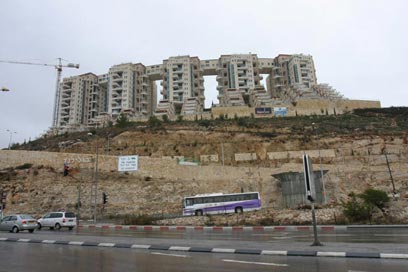
Sources close to Holyland affair: It was like a mafia
Sources involved with approval of Jerusalem complex's construction tell Ynet of methods employed by higher-ups to advance real estate project now at center of serious corruption scandal related to former Prime Minister Ehud Olmert. 'Objectors who changed their minds suddenly purchased villas worth millions,' source says
The Jerusalem Holyland complex, which is at the center of a serious corruption scandal, has angered the capital's residents for many years now, and was even dubbed an "ugly real estate monster" by a judge. An examination into the project's approval, including the 32-story building, reveals troubling findings. Sources involved in the process described to Ynet the shady tactics employed by the higher ranks that led to the approval of the project. "It was like a mafia," one source said.
From the local planning and construction committee, the city council, and the Jerusalem District Planning and Construction Committee, sources recounted to Ynet the dubious proceedings. Some of the sources involved in the approval of this "real estate monster" now fear exposure, in the midst of an extensive police investigation.
The Holyland project first received a green light from the local planning and construction committee, headed by Uri Lupolianski, who later served as the mayor of Jerusalem. Next, the decision on construction permits was passed on to the district committee, where it received its final approval in November 1999. Despite the fact that the approval was given with an almost unanimous majority among the 17 committee members, sources now say that a storm raged beneath the surface.

Holyland project in Jerusalem (Photo: Shlomi Cohen)
"It felt like we were being chased, there was infinite pressure on us," a source involved with the district planning committee told Ynet. "We received very clear hints that we shouldn't object. I came across things that were shocking to me – they followed us and recorded conversations. I was shocked to later find documents with transcripts of what we said," the source said. He described several odd occurrences: "There were objectors, and they slowly disappeared. Some of those who changed their minds suddenly purchased villas worth millions. It was completely foul from the start."
Hand-picked committee panels
According to the source, then-mayor Ehud Olmert was personally involved in advancing the project. "He arrived at the committee – which is a rather rare occurrence – and spoke adamantly and forcefully. The initiators would bring five different advisors each time to tell us how important it was to approve the construction, and every big and small decision was made in subcommittees that we were not privy to, or in such a constellation that included only people who would vote in favor. This is how permits were slowly granted, and the buildings were raised in the same manner. It was obvious that everyone was on board, even ministers in various ministries."
The construction permits, the sources say, were granted in a number of steps. After the initial permits for the Holyland project were given, more and more minor permits trickled through, allowing the elevation of the buildings to heights that completely exceed Jerusalem construction norms.
Dr. Meir Margalit, who served in the city council's Meretz faction at the time, recalls dilemmas the council members faced. "We had a principle disagreement about massive upward construction, because we wanted to maintain the skyline and Jerusalem's character as it was. We objected to the bombastic construction that Olmert wished to advance," he said.
He detailed the former mayor's efforts to persuade his objectors. "His usual argument was that there are no land reserves in Jerusalem, and there was no choice but to build upward. He added that the buildings were luxury buildings which would attract a strong population to Jerusalem, and their municipal taxes could be invested in the neighborhoods," Margalit said.
"He seemed smug all the way, and there was a sense that it was all prepared and settled externally anyway. He told us, 'You deal with the little things; my lawyers will settle the affair.' I remember the heat of the argument and the frustration," the Meretz city council member added.
'District committee responsible'
A Ynet glimpse at the protocols of council meetings from that period reveals a fraction of the heated debate. In January 2000, then-city council member and current Deputy Mayor Pepe Alalu submitted a query to Olmert under the headline: "Crowding and the height of construction in Jerusalem". He demanded criteria be set for construction height in the city's guidelines. "Today we see that projects are popping up all over the city aspiring to 16-stories, 20-stories, 30-stories, and the sky is the limit. Chaos rules," he said.
Olmert, on his part, insisted that there were guidelines on construction height policies. He claimed that the professional echelon, headed by the city's engineer, determined the policy after weighing the city's needs and taking into consideration the density in the capital. "There were all kinds of proposals, and all kinds of ideas. The committee for open areas that was appointed by my predecessor submitted a proposal to construction 40 and 50-story buildings in Jerusalem, and we did not accept them, we accepted a proposal that I believe was reasonable," Olmert had said.
The former mayor pinned the decision on the district committee: "There were members that proposed holding a discussion in the district committee, I have no control over the district committee, it is sovereign to make its decisions."
Eleven years later, the affair continues to echo within the district committee. "Holyland is a code word for remorse," a committee source said, "it's a mark of disgrace, which is used when members consider folding in a vote."
Tani Goldstein contributed to this report










